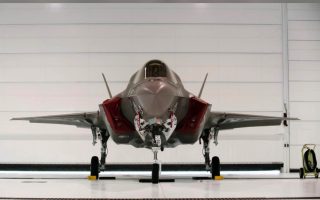Ankara’s risky bartering with Washington and Moscow

Information came to light recently indicating that the United States may, under certain conditions, review its decision not to supply Turkey with F-35 fighter jets.
Since being ejected from the program, in which it was also a production partner, Turkey has been going to significant lengths to make up for lost ground against what seems to be Greece’s growing superiority in the skies. It is in talks with the Europeans and the British for Eurofighter jets, hinting at a possible shift of its air force toward Russian or mainly Chinese fighters, though the chances of this happening are slim. And even though it had explored this option in the past, it is reaching out to Qatar for access to French Rafale jets through military cooperation. None of these alternatives, however, are equal to the acquisition of the F-35s.
What would a revival of US interest in Turkey’s acquisition of the jets mean? That the Russian S-400 missile system, which cost $2.5 billion and sits unused in some warehouse or other, may have to be moved outside Turkey. Several questions arise here: Which country will get the system and can they activate it if, as can be reasonably assumed, this requires Moscow’s approval? How will Russia’s consent be secured (for example, the system can’t go to Pakistan because of opposition from India, which Russia wants as a counterbalance to China)? What concessions will President Vladimir Putin demand in return from Turkey’s Recep Tayyip Erdogan? And how will the latter “sell” these concessions to his domestic audience when he is supposed to be pursuing an independent foreign policy and not yielding to US pressure?
The biggest question, however, concerns Turkish-Russian relations. Moscow is an important partner in some very important areas for Ankara, such as in Syria, where President Bashar al-Assad has attached strict terms to a rapprochement with Erdogan. Moscow’s role is also important in Ankara’s energy plans, both in terms of Turkey’s transformation into a Russian natural gas supply hub and in the development of nuclear energy.
Erdogan is in no position to jeopardize these benefits, not to mention that he will come under fire from his rivals for buying a missile system he cannot use. He is, in fact, trapped in a corner by past policies. On the one hand, he dented his credibility with the United States and, in combination with other misguided choices – such as worsening ties with Israel, choosing to play the role of regional bully and showing reluctance in aligning with American positions – he undermined Turkey’s standing in Congress and created uncertainty at the institutional level, particularly at the State Department and the Pentagon. On the other hand, expectations have inevitably been cultivated on the part of the Kremlin, even with Ankara’s balanced position on the matter of Ukraine.
In any case, the association of the S-400 with the F-35s concerns the balance of power on the international stage and Ankara’s relations with Washington and Moscow, at a time when it appears to be discreetly drawing closer to the latter (e.g., in the co-production of air defense systems for Ukraine). It makes sense for Erdogan to wait for the next American president to be elected so he can potentially negotiate on this issue from a better position, but he will need to do a lot more to convince Congress of Turkey’s intentions. Because, if the backbone of Washington’s bureaucracy wants to keep Turkey in the American fold come what may, the current balance of power in Congress is not favorable to such initiatives from Erdogan. Once the elections are over, however, there may be a new set of circumstances and a new president in the White House that will make things easier.
However, when it comes to the question of how the US deals with a partner like Turkey, a country with its particular characteristics and a recurring pattern of unpredictability and aloofness when it comes to American interests, there is no one clear answer (at the establishment level).
Apart from the operational challenges regarding where, when and how the F-35 will be used if it is acquired by a country that is constantly making a show of flexing its muscles, another important question that arises is to what extent a country with a strong defense industry of its own will remain even relatively aligned with American directives, and whether more military clout would ultimately whet its appetite for conflict with neighboring or other countries.
In short, would it be easier to control Turkey if the acquisition of the F-35s goes through or would it be harder in the long run?
Constantinos Filis is the director of the Institute of Global Affairs and an associate professor at the American College of Greece. He is also co-author, with Katerina Sokou, of the book “The Cliffhanger,” on the potential consequences of the US presidential election on Greek-Turkish relations.





